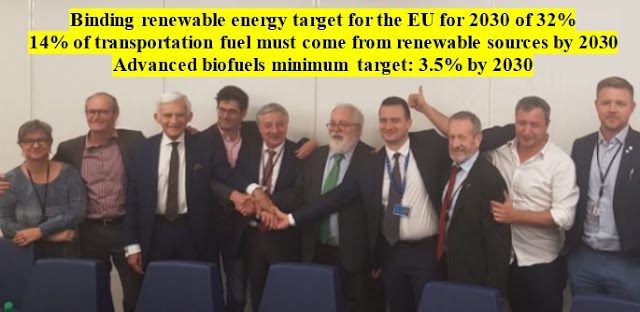RED II agreement - Target for 3.5% advanced biofuels for the EU by 2030
Type of post: NEWS IN BRIEF.
On June 14, a political
agreement on a revised Renewable Energy Directive (RED II) was reached between
negotiators from the Commission, the European Parliament and the Council (see official
statement, 14/6/2018). The new regulatory framework includes a binding renewable energy target for the EU
for 2030 of 32% with an upwards revision clause by 2023.
The press release does not
mention the new rules affecting biofuels. However, several media have disclosed
some key points of the agreement that I highligth below:
- At least, 14% of transportation fuel must come from
renewable sources by 2030.
- Crop-based biofuels are
capped at 2020 levels but cannot exceed 7%.
- Advanced biofuels with minimum targets: 0.2% in 2022, 1% in 2025
and 3.5% in 2030.
- Food crops (such as palm
oil) that result in high indirect land use change (ILUC) are to be phased out
through a certification process for low-ILUC biofuels.
Figure 1. MEPs posing with
Miguel Arias Cañete (EU’s climate and energy commissioner who was acting as a
mediator in the talks) after reaching the agreement
The text of the Directive will
have to be formally approved by the European Parliament and the Council. Once
endorsed by both co-legislators in the coming months, the updated RED will be
published in the Official Journal of the Union and will enter into force 20
days after publication. Member States will have to transpose the new elements
of the Directive into national law 18 months after its entry into force.





